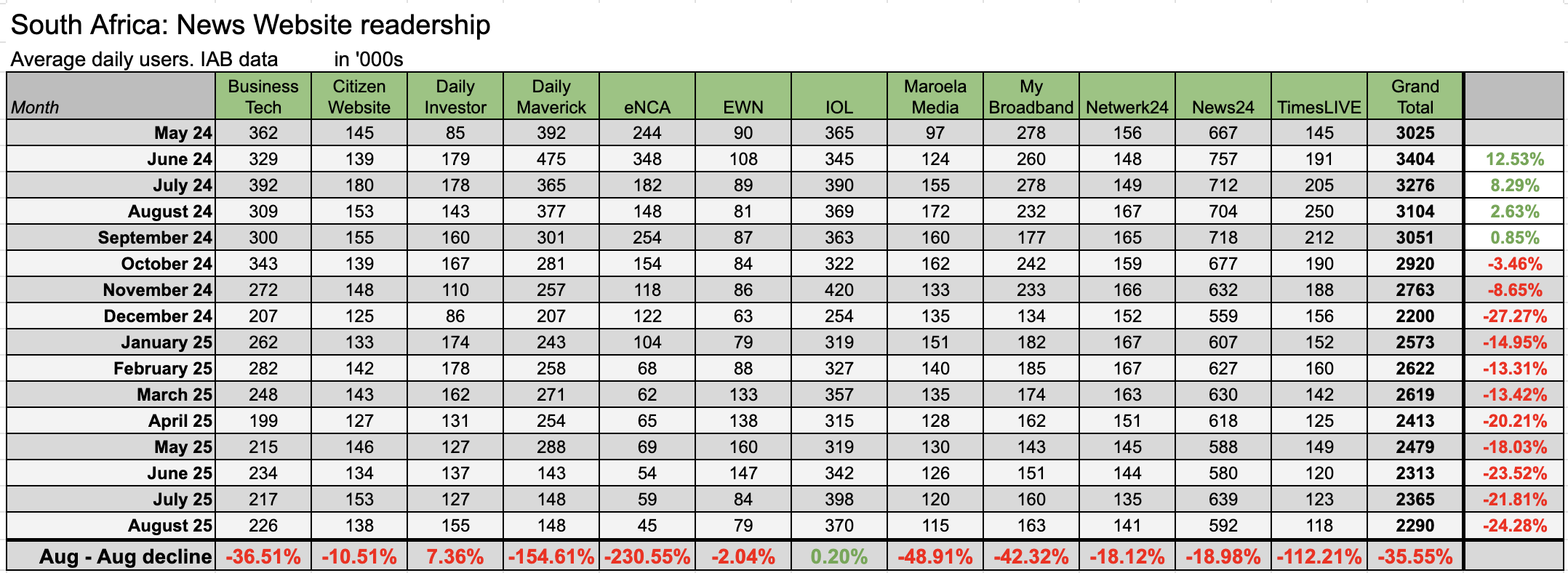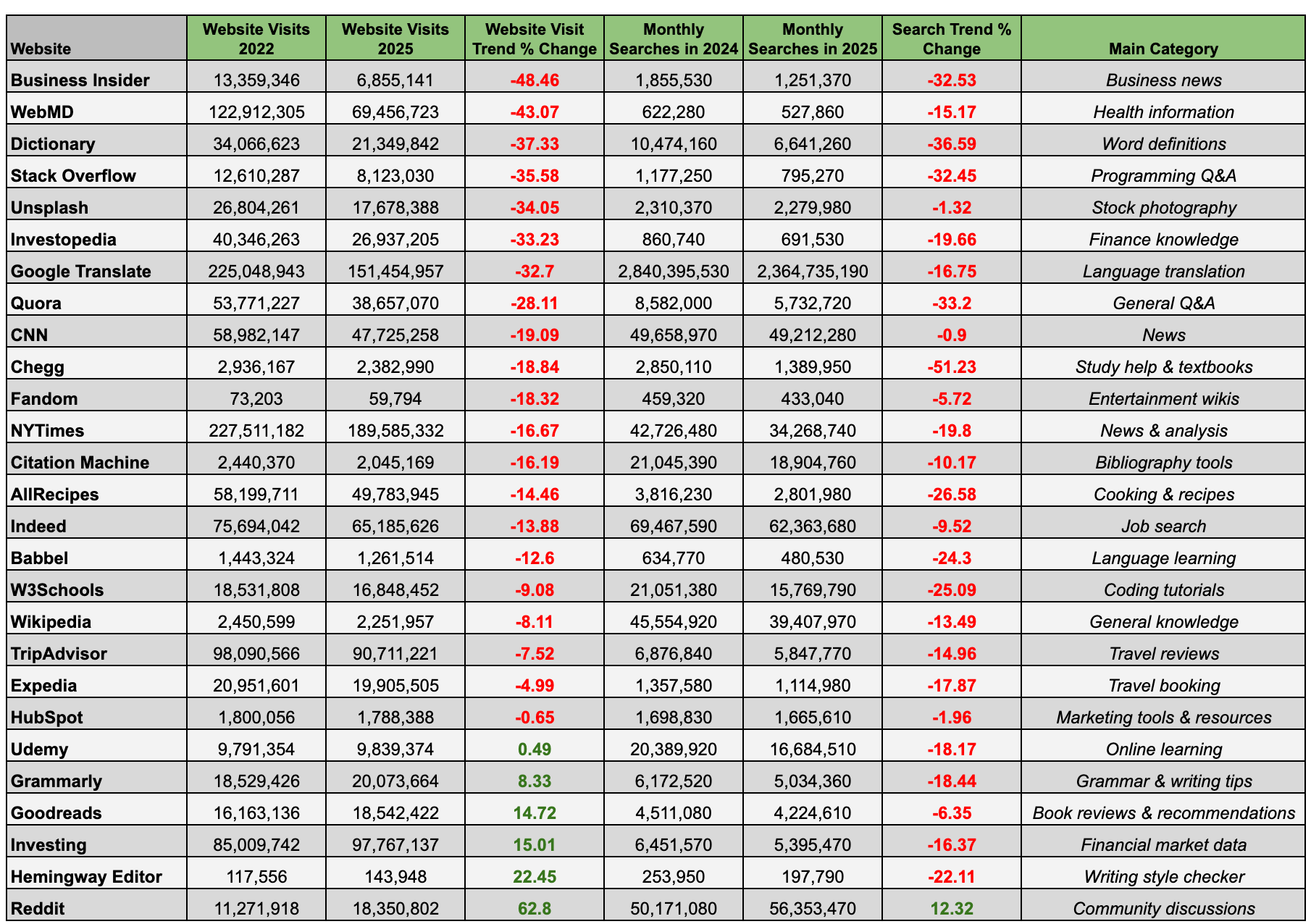Here is a big question: what is artificial intelligence going to do to website income, and how will that change the internet?
The problem with big, global, tough questions like this is that the quality of the answers you find will necessarily going to be all over the place. There is little certainty here, but I think it's inevitable that the effects are going to be dramatic. And I mean really, really dramatic. Not just “things will change” dramatically, but “some very fundamental assumptions are going to change” dramatically.
And you can see that already in the astounding decline in the click rates on global news websites, particularly news websites around the world.
This needs a bit of context, so let me go back a bit. As a newspaper editor, I became obsessed with internet traffic for the very obvious reason that the internet was eating our lunch with boundless appetite, so, you know, you need to know your enemy. Or, in our case, not so much the “enemy” but something much more complicated: the current disruptor and future potential cash cow. The internet was and is both a devastator and a potential saviour. To say this is an odd situation would be to understate.
The decline of print and the rise of internet usage were and remain a kind of pivot point: as we lost newspaper readers, we gained internet readers; actually, many more, as it happens. The obvious question was, can you adapt your business model fast enough to monetise your internet readership as your print publication readership declined? The answer to that is largely “no”, which you can see manifest in the dramatic decline in the size of newsrooms around the world.
I’m old enough to remember The Star newsroom back in the day. It was huge; there were over 100 reporters on the newsroom floor. This number excluded editors, photographers, graphic artists and managers. You had to queue just to speak to one of the three news editors. There were dozens of specialist reporters, someone permanently dedicated to reporting from the Johannesburg High Court, for example, along with a chess columnist. Imagine. A permanent labour reporter and a fleet of people reporting about politics were on the payroll. Currently, as far as I can tell, the business section of the Star has one reporter. When I worked there in the late 1980s, there were probably around ten people working for Business Report, just at the Star, never mind the other five papers in the group.
The decimation of newsrooms began with the Independent Group papers, which have been awfully managed over the years. The Star newsroom, in which I worked, is now an empty shell, selling only around 5,000 copies a day compared to the 250,000 printed every day when I worked there. But the decline certainly has not been confined to the Independent Group, as layoffs across the entire industry have been a constant feature for two decades now. When I was editor of Business Day, I had some 20 news reporters; at the newspaper’s height, it had double that number. Generally speaking, we are looking at an industry which has essentially halved in size over the past 20 years.
So, it can’t get worse than that, right? Business models have stabilised; large sections of the press are focused on the internet and have subscriber systems or something akin to that. The transition has been achieved. Right? I beg to differ: it can, and will, get much worse. Just have a look at these numbers: they show daily website visitors to SA’s biggest news websites over the past year and a bit.

Wowzer - that is brutal. Just as a note, the numbers are put out by the Interactive Advertising Bureau of South Africa. Still they are essentially the Google Analytics numbers, so I raise a note of caution here. After working with these numbers for over a decade now, let me tell you, they are about as reliable as a Cape Town weather forecast.
The problem is that defining usage is very difficult and determined differently by different operating systems and web measures. And they bounce around all over the place. Just to take one example, on some websites, your cookie consent has to be turned on to be counted, and if it isn’t, that can lead to inaccurate data collection.
One of the ways to check this is to compare “visits” (defined by Google as an individual visiting a website in a 24-hour period) and “pageviews”, which is just the total number of URLs readers click on. To take a few examples, the Daily Maverick's and ENCA's “visits” have eroded badly over the past year, but their pageviews have declined only by about 40% August to August, which is more or less the industry average, so there is something strange going on here. Aren't pageviews just a better measure? Well, no, because on a pageview count, every visitor to Netwerk24 is, on average, visiting 14 stories every day, which I just can't quite believe. But it doesn’t matter really; the overall decline for the industry, August to August by pageviews, is actually worse than measured by “visits” or “unique users”. And if Google can’t measure these numbers accurately, then you know they are hard to measure.
There is another thing: This year-on-year figure doesn’t reflect the huge growth in all the news websites over the past decade. The one I know most intimately is the Daily Maverick site, which had around one million monthly visitors when I joined in 2019, and had at its peak about 13 million. It had about eight million when I left last year, and as a direct consequence (joke), it has about 4.4 million now. Still, even with the drop in numbers, it's still at least four times the size it was just a few years ago, and overall traffic to other websites has also risen over the same period. We are all web crawlers now.
Anyway, when I saw this number, it worried me terribly. What has been causing the downtrend? The simple answer is artificial intelligence. The news industry has been battling with a new thing called the “zero click search” over the past few years, which is where Google summarises the outcome of a search before it even lists the websites where it stole borrowed the information.
But that is just part of the problem, because later I was sent some research on global websites, and this is what they found using a research tool called www.ahrefs.com for website visits and Google search data for the, well, search data:

This is a very busy table, and covers a longer period (2022-2025) than the South African one above, but it's fascinating. Notice, by the way, how the search numbers loosely correlate with the website-visit trend (although the differences are important too), which provides a kind of validity check. But the crucial thing is that it's not just news websites that are collapsing; recipe websites are down, health websites are down, travel websites are down. It's amazing how Google reflects how badly some Google services are down! Including, significantly, Google translate.
The main reason for this is obvious: people are not using websites any more, they are using ChatGPT, Claude, Gemini and Deep Seek, etc. But here is the scary thing: so far, the total usage of chatbots is only around 10% of all internet clicks - but it's rising very fast.
What are the longer-term consequences?
I have some ideas below, but because they are speculative and because I would like you to subscribe to my blog (Please! Honestly, it's cheap as chips - actually cheaper), it's for paid readers only. Oh, and by the way, I'm enjoying writing the pieces so much, I'm going to try and produce two a week from now on. That's double the content for the same bargain price!
